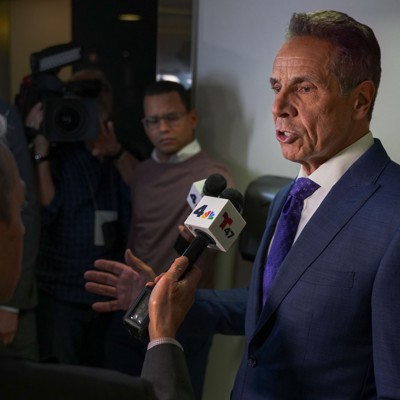Mayor Eric Adams promised to be a “tech mayor.” In his four years in office, Adams embraced crime-fighting robots, accepted a handful of paychecks in cryptocurrency, remade a de Blasio-era plan to provide internet at public housing buildings and partially delivered a new app for accessing city services.
Whether Adams earned the label of tech mayor or not is beside the point for now: He’s not running for reelection. In his absence, another candidate may be seeking that title.
With less than a week left before early voting starts, independent mayoral candidate and former Gov. Andrew Cuomo announced a proposal to hire a “chief innovation officer” if elected. As described in a short press release, the new role would seek investment from emerging technology industries, as well as improve how the city uses technology to better deliver services. The “senior administration position” – which a campaign spokesperson later said would be a deputy mayor-level position – would be chosen in consultation with an “Innovation Council” made up of leaders in biotechnology, artificial intelligence and cryptocurrency and blockchain. There may be some appeal in that proposal for technology leaders, or even crypto fans with deep pockets and no candidate. And the other mayoral candidates’ relative lack of focus on tech and innovation leaves a small lane for Cuomo to occupy.
But to some, the proposal read more like a last-minute political play than a substantive policy proposal. “It seems like a very cynical ploy to try to claim a mantle of being a tech and innovation person,” said a former city technology official, who added that Adams did the same and failed to deliver. The former official was granted anonymity to speak about the current state of civic technology in the city.
Democratic mayoral nominee Zohran Mamdani maintains a double-digit lead over Cuomo in the polls, and Republican nominee Curtis Sliwa has shown no interest in Cuomo’s pleas to drop out of the race. It’s not clear how much a tech focus could help Cuomo at this point.
Noel Hidalgo, executive director of the civic technology organization BetaNYC, noted that Cuomo’s proposal is focused on industry leaders, not a broader community of New Yorkers. “Where do the people of New York engage in this innovation economy?” he asked. “I don’t think this is a sane framework to ensure that the needs of New Yorkers are met. All I see is the needs of corporations are met.” Some tech leaders and companies have been supportive of Cuomo’s run, showing their support primarily through donations. During the Democratic primary, DoorDash donated $1 million to a PAC supporting Cuomo, while Lyft donated $15,000. Those donations have slowed since Cuomo’s primary loss, though AECOM gave $125,000 to the pro-Cuomo PAC just after the primary, and the biotech company Natera gave to the PAC before and after the primary. More recently, Airbnb co-founder Joe Gebbia recently gave $1 million to the pro-Cuomo PAC, and another $1 million to an anti-Mamdani PAC.
The other part of Cuomo’s proposal deals with how the city government uses technology. Among the CIO’s responsibilities would be helping the city “adopt and deploy new technologies to deliver smarter, faster, and more transparent public services.” But there’s little detail to describe how the job would actually work, how it would differ from work already being done by the Office of Technology and Innovation or the city’s Economic Development Corporation, or what, if any, kind of budget or authority it would have. Hidalgo noted that it doesn’t mention any problems with the city’s approach to technology, or how it would address issues identified by the current administration, like digital equity or how the city uses AI.
Cuomo campaign spokesperson Rich Azzopardi said the CIO would be tasked with “coordinating all the efforts in the agencies.” But he didn’t answer when asked if the CIO would be installed in addition to the city’s chief technology officer, who also reports directly to the mayor, and who was intended to coordinate the city’s technology efforts. (Adams created that position at the beginning of his own administration, a result of consolidating all of the city’s disparate IT and tech offices into one entity called the Office of Technology and Innovation.)
Cuomo’s proposal comes months after some in the (admittedly niche) civic technology community lamented the lack of serious discussion of technology issues in June’s Democratic primary for mayor.
While it’s not necessarily surprising to see candidates brush over these issues in a race with lots of competing priorities, it still causes frustration. “Most voters aren’t going to make their choice based on technology and innovation,” the former city technology official said. “At the same time, technology and innovation has never been more critical or more important in government’s ability to deliver on its promises.”

